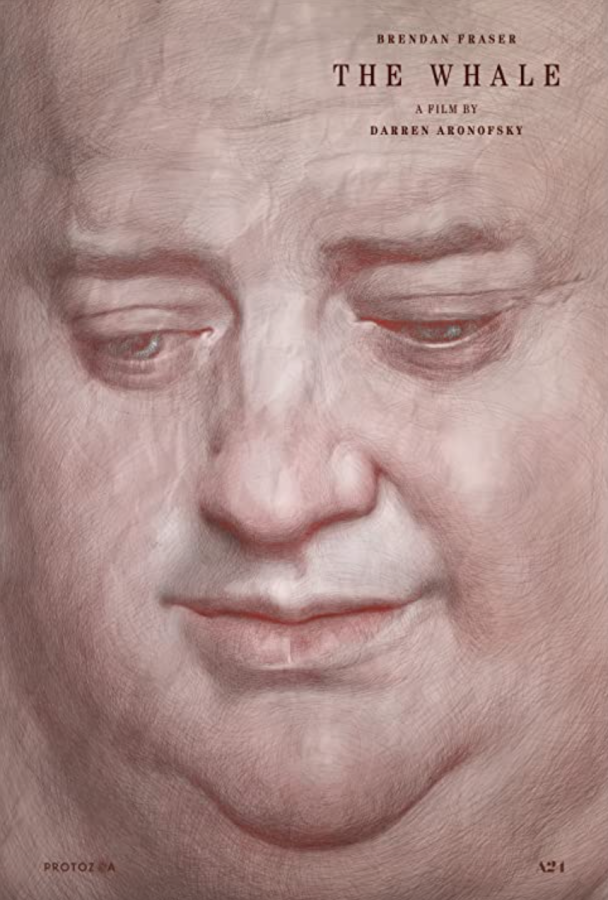The Whale: Why it’s the Best and Worst Movie I’ve Ever Watched
“Frasier bravely left his dignity behind for this role, putting on pounds upon pounds of prosthetics, and placing himself in the shoes of a man slowly and painfully losing everything.”
The psychological drama The Whale debuted Dec. 9 at the 2022 Toronto Film Festival. Starring Brendan Fraser and Sadie Sink, the film follows an overweight, mentally unstable man suffering from congestive heart failure living out his last days in solitude in an attempt to reconnect with the daughter he left many years ago.
The movie highlights the protagonist Charlie’s struggles of self-image, hiding himself from people he doesn’t know, such as the students in the online class he teaches, and the pizza delivery man. At one point in the movie, Ellie (his daughter) calls him ‘disgusting’ amidst an angry outburst, which isn’t concentrated upon much, but it struck me as cruel.
Later, while confronting a missionary (long story), Charlie screams, “Do you think I’m disgusting? Am I disgusting?” to which the missionary screams back, “Yes, you’re disgusting!” The silence that ensued afterwards nearly brought me to tears.
I didn’t exactly appreciate the way the cinematography and sound direction depicted Charlie in this film. Whenever he was shown delving into an eating binge or being mentally affected by his condition, ominous music would play in the background, similar to soundtracks for horror movies.
The camera angle would frequently tilt downwards, enhancing Charlie’s sheer size until he became intimidating and almost inhuman. Whether this was an intentional choice to make the audience feel uncomfortable, or was an unintentional bias against obese individuals, it created a clear disconnect between Charlie and the viewers.
The eating binges were the hardest for me to watch. As Charlie stacked one pizza slice on another, piling whatever was in his fridge on top of it and into his mouth, I wanted to scream. To me, the sole reason for this cruel self-destruction was the lack of love and affection Charlie was forced to experience. Throughout the film, characters yelled at Charlie, slammed doors on him, and regarded him with disgust, when all he wanted was to reconcile with his loved ones during his last days. Seeing what this did to him alone almost broke me.
Which brings me to my next point: the dark side of America. While the film was playing, I consistently wondered how many other, real-life stories like this exist. How many people live in a dingy apartment in Idaho, isolated and withering away in their own solitude? How many people have been cast away by their families, with the furious promise of no forgiveness? Not only is obesity one of the leading health issues in America, solitude and isolation are ever present.
The few people who continued to visit Charlie made up his world, which tells us that at times, the best thing to do is merely show up.
The fact that the entire movie took place in Charlie’s apartment gave it a claustrophobic and constricting feel, reflecting Charlie’s feelings towards his home.
Director Darren Aronofsky stated that it was difficult to keep the film engaging enough while never leaving the tiny two-bedroom apartment that housed the protagonist. To solve this, changing camera angles and various perspectives as well as zoom shots were utilized to personalize the film and keep the audience engaged.
Many fans are demanding that Brendan Fraser receive an Oscar for his performance. I don’t disagree. Leaving his dignity behind on stage, putting on pounds upon pounds of prosthetics, and placing himself in the shoes of a man in the process of losing everything so painfully and slowly was an incredible feat for an actor of any skill level.
Of course, Fraser has been in the movie industry for over 30 years, and it shows. I saw him in The Mummy, a relatively old film, and his performance was, as expected, outstanding. His witty portrayal of an adventurer searching for a trove of jewels and riches was spot-on. What I noticed, though, was that Fraser had always been depicted as the dashing and courageous hero in his youth, but when watching this movie, you could barely tell. Not only does this reflect his range, but his willingness to depict his skill in any way possible, something that many actors do not possess.
Something heartwarming that I discovered after looking more into the movie were the events that occurred after the premiere. During the Venice Film Festival, after The Whale was shown, Fraser was greeted on the red carpet with a 6-minute standing ovation from the audience. He got emotional, and ended up bursting into tears, a gesture that shows the great emotional impact this film had on him.
Additionally, it’s definitely not just Fraser who outdid himself during this film. Sadie Sink’s performance as Ellie, Charlie’s daughter, was incredible. As an isolated teenager struggling in school, Ellie’s character was full of sarcasm, uncontrollable anger, and usually cynical thoughts. However, Charlie wishes to reconnect with the daughter he had left when she was nine. We later get to know that he had left to pursue a relationship with one of his students, namely, Alan.
A major conflict for Ellie’s character was the loss of hope the people around her had in her, and how it was only Charlie that thought of her as an amazing human being. Despite this, Ellie consistently had a hard time forgiving her father, which was expected. The sub-plot of adolescent challenges made the movie even deeper, as expertly executed by Sink.
All in all, The Whale was a movie like no other I’ve ever watched. Darren Aronofsky is famous for his disturbing films such as Black Swan and Requiem for A Dream, but as someone who has never exactly watched a psychological drama before, it was a lot.
The movie was effective in its delivery and powerful impact upon the audience, but terrible in the sheer hopelessness it portrayed. Given the choice, I’d give this movie a 5/5. Well done Aronofsky, you’ve made thousands of people feel uncomfortable again.

Anah Khan (she/hers) started writing for the Beachcomber in 2021. She is interested in covering new organizations and programs in BHS and writing opinion...













